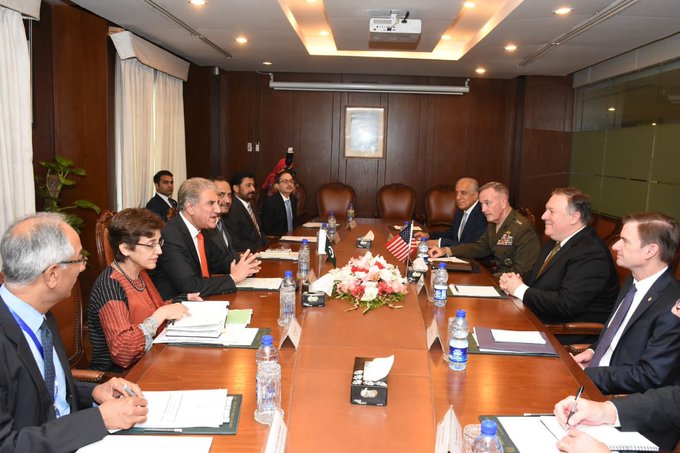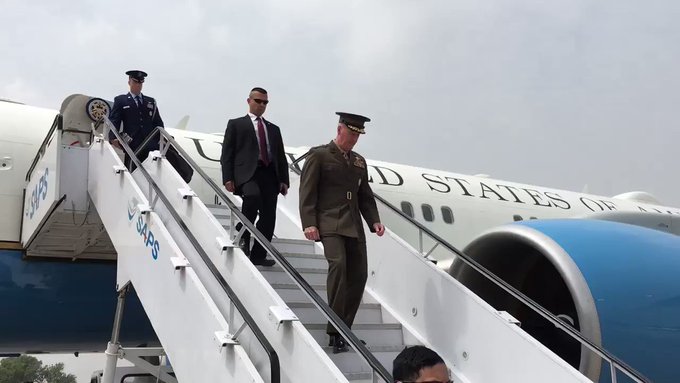Prime Minister Imran Khan on Wednesday held a meeting with Secretary of State Michael Pompeo and Chairman of the Joint Chiefs of Staff Gen Joseph Dunford at the PM House in Islamabad.
Foreign Minister Shah Mehmood Qureshi and Chief of Army Staff Gen Qamar Javed Bajwa were also present in the PM’s meeting with the US delegation.
Following the meeting, Pompeo and company left for India, where the US delegation is scheduled to hold a more elaborate round of talks.
‘I decided against raising the $300m issue’: Qureshi
“The Pakistani perspective was presented responsibly to the US delegation,” FM Qureshi said in a press conference later on. “You could have guessed by the body language that the meeting was a cordial one. We tried to understand their wishes and put forth our own expectations and concerns.
“I told them that if you want to proceed with Pakistan, the foundation lies in trust, frank and candid conversation. And until and unless we address concerns from both the sides, progress is not possible.
“I’m pleased to announce that Secretary Pompeo invited me to the US. When I will go to New York for the UN conference, I intend to engage with him [US officials] once more.”
Regarding the US delegation’s meeting with PM Khan, Qureshi said: “During the meeting at the PM House we all sat down and exchanged views. In the past, they used to come, meet the PM and then went to the GHQ. Today’s meeting sent a clear message that we are all on the same page.
“Ice has been thawed,” he said. “Today we felt that we have created an atmosphere to reset our relations, and the lack of trust that was present has been broken which is a very positive development.
“Believe me, if our narrative had not set in with them, the atmosphere would have been different, your questions to me would have been different and the nature of Mr.Pompeo’s tweet before leaving would have been different.
“I also told them, and they agreed, that there is no benefit of a “he said, she said” narrative. It only ruins the climate of talks. Finger pointing will get us nowhere. The other way is to understand where the gaps are and where to bridge those gaps. I identified a lot of those gaps and presented it to them. Where our narratives are different on similar issues.”
Qureshi said that working together is in the best interest of both the countries. “We have been allies, and we have had tensions,” he said. “But our history shows when we have worked together, it has been in the best interest of both countries. We did this when we worked together to decimate Al Qaeda.”
The foreign minister said that he decided against raising the US decision to scrap the $300m in aid.
“This wasn’t a new decision,” he said. “That decision was taken before this govt took charge. I gave this matter some thought then I decided against raising it because free nations think along the lines of self-sufficiency. We will take a new direction.”
Pompeo, Qureshi hold talks
Before the meeting at the PM House, FM Qureshi had held the opening round of talks with the Pompeo-led US delegation at the Foreign Office in Islamabad, where the two sides had engaged for 40 minutes and discussed “bilateral, regional and international issues”.
“FM Qureshi underscores the need to reset bilateral ties on basis of mutual trust and respect,” FO spokesperson Dr Muhammad Faisal stated on Twitter, adding: “Safeguarding Pakistan’s national interests will remain supreme priority.”
Pompeo and Gen Dunford had arrived in Islamabad just before 1pm.
The secretary of state’s plane had landed at the Nur Khan Airbase where he was received by foreign ministry’s Director General (Americas) Dr Zafar Iqbal and American diplomats.
He headed for the US embassy in a motorcade of about 20 white Toyota Land Cruisers and a police escort.
‘Resetting bilateral relations’
Earlier, while talking to media representatives on board his Pakistan-bound flight, Pompeo had said he was visiting Pakistan to reset bilateral relations.
“First stop Pakistan; a new leader there. I wanted to get out there at the beginning of his [Khan’s] time in an effort to reset the relationship between the two countries,” he said in his opening statement.
“We have worked closely with the Pakistanis in my role as CIA [Central Intelligence Agency] director. Our teams have been working together for a long time. There are lots of challenges between our two nations for sure, but we’re hopeful that with the new leadership, we can find common ground and begin to work on some of our shared problems together,” he added.

Pompeo said the new Pakistani government has expressed good-faith intention to improve bilateral ties.
He said he was going to Islamabad with the US military chief Gen Joseph Dunford to have discussions with Pakistani authorities.
“We’ll also meet with General Bajwa, who we both know, who I’ve met with a number of times, as well as my counterpart, Foreign Minister [Shah Mehmood] Qureshi,” he said.
“So we’ll have three opportunities to walk through the complexity that is this relationship and hopefully begin to make some progress so that we can get back to a set of common understandings,” said Pompeo while referring to a possible meeting with Prime Minister Imran Khan.
“So, that’s really the very straightforward objective. I think it’s important to meet the new prime minister, Prime Minister Khan, early on in his time in office,” he said.
A journalist reminded the Secretary of State that his trip comes right after the announcement that the US was cutting $300 million in military aid to Pakistan.
“What do you think of that as a start-off point for this new relationship that you’re trying to build?” Pompeo was asked.
“Look, this wasn’t news to the Pakistanis. It made a lot of headlines over the last few days … but they were told this past summer that they weren’t likely to get that money,” Pompeo recalled.
“And the rationale for them not getting the money is very clear. It’s that we haven’t seen the progress that we need to see from them.”
‘Turn the page’
Pompeo said the very reason for this trip was to try and articulate what the US expectation was, what Pakistan could do and the things that they expect the US to do. “And see if we can’t find a path forward together,” he added.
The secretary noted that most of the developments affecting Pak-US relations took place long before Khan was in power. “I’m hoping we can turn the page and begin to make progress. But there are real expectations,” he said.
“We need Pakistan to seriously engage to help us get to the reconciliation we need in Afghanistan.”
Pompeo pointed out that both the outgoing and incoming commanders of US forces in Afghanistan had said that this was not possible without Pakistan’s assistance.
He acknowledged that Pakistan too had important interests, including security interests, in Afghanistan to “make sure they get the issues at their border right, and we need their help”.
He said he was hopeful he could convince the new Pakistani government to provide that assistance because in a recent conversation with him, Prime Minister Khan had acknowledged that peace in Afghanistan was a priority for him as well.
“I think he said they’re the number one or number two advocate for reconciliation in Afghanistan. I said I think we’re number three – all of us wanting that. So we have a shared goal there. I hope we can find a way to achieve it together,” Pompeo said.
He said the US was providing different sets of resources to Pakistan when it made sense for the United States to do so because the partnership was in a place that both countries were coordinating their actions.
“If that arises again, I am confident we will present to the President [Trump] the rationale for that, and then something like that might make sense,” he added.
Asked why it made sense to suspend the assistance now, Pompeo said: “We certainly haven’t seen the progress that we would hope to have seen… certainly not progress that would be sufficient for us to have advocated for turning back on that financial support.”
Responding to another question about whether he will raise the issue of Dr Shakeel Afridi during his trip to Pakistan, Pompeo said: “I have a long history of raising the case of Dr Afridi as the CIA director. I’ll leave it at that.”
Pompeo confirmed that Ambassador Zalmay Khalilzad was with him on the plane and that he was going to join the State Department team to assist him with the reconciliation effort. “So, he will come on and be the State Department’s lead person in the reconciliation talks,” he said.
Ambassador Khalilzad, he said, would work with the State Department “to be full-time focused on developing the opportunities to get the Afghans and Taliban to come to a reconciliation. That will be his singular mission statement.”
Source: Dawn





